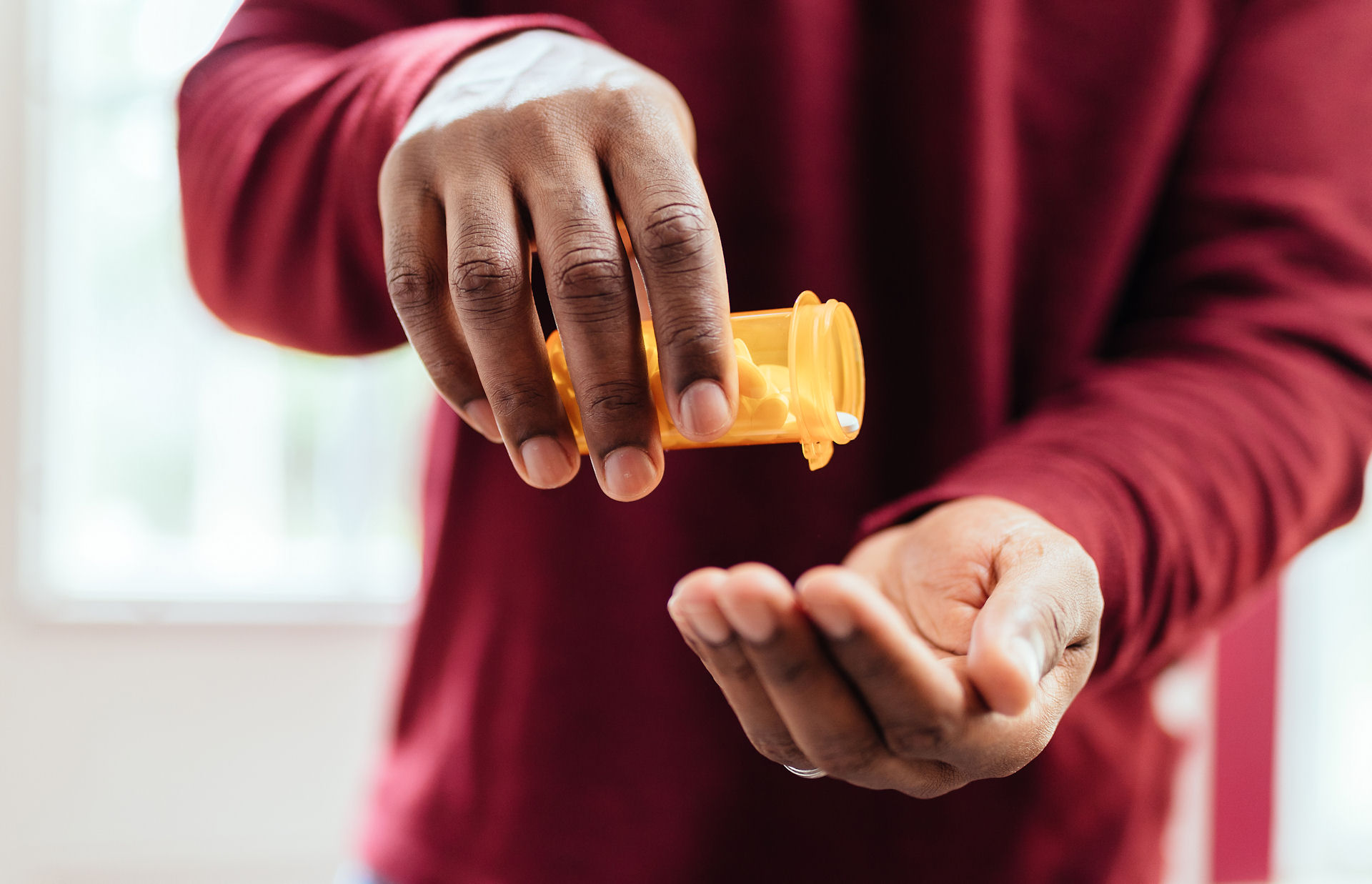When it comes to powerful stimulants, it’s crucial to know the difference between amphetamine vs methamphetamine. While these two drugs share similarities, they differ in effects, risks, and treatments.
Both of these drugs are Schedule II class drugs, meaning there is a risk of abuse and addiction. Stimulants speed up the CNS (central nervous system), increasing respiratory and heart rate and raising blood pressure. They also increase energy and focus.
Learn the difference between amphetamine vs methamphetamine and how to recognize if someone is struggling with a stimulant addiction at Free by the Sea.
What is the Difference Between Amphetamine and Methamphetamine?
Jump to Section
Amphetamine and methamphetamine are both stimulant drugs, but they have some notable differences. Here is a detailed comparison:
Chemical Structure
Amphetamine: Chemically known as alpha-methylphenethylamine, amphetamine consists of an amine group attached to a phenyl ring.
Methamphetamine: Known chemically as N-methylamphetamine, methamphetamine has an additional methyl group attached to the amine group, making it more potent and longer-lasting.
Medical Uses
Amphetamine: Prescribed for treating attention deficit hyperactivity disorder (ADHD), narcolepsy, and certain cases of obesity. Common medications include Adderall and Dexedrine.
Methamphetamine: Also prescribed for ADHD and obesity but less commonly due to its higher potential for abuse and addiction. The prescription version is known as Desoxyn.
Potency and Effects
Amphetamine: Generally less potent than methamphetamine and has a shorter duration of action. It increases focus, energy, and alertness.
Methamphetamine: More potent and longer-lasting. It crosses the blood-brain barrier more effectively, leading to stronger and more prolonged effects on the central nervous system.
Abuse Potential
We will know peace.Amphetamine: While it has a potential for abuse, it is lower compared to methamphetamine.
Methamphetamine: Higher potential for abuse and addiction due to its potency and long-lasting effects. It is often used recreationally and can lead to severe health problems, including addiction and neurotoxicity.
Legal Status
Amphetamine: Classified as a Schedule II controlled substance in the United States, indicating a high potential for abuse but accepted medical use under severe restrictions.
Methamphetamine: Also a Schedule II controlled substance, but its illicit form is widely abused, contributing to significant legal and public health issues.
Health Risks
Amphetamine: Can cause increased heart rate, blood pressure, anxiety, and insomnia. Long-term use may lead to dependency and other health issues.
Methamphetamine: Has more severe side effects, including extreme weight loss, severe dental problems (“meth mouth”), and skin sores from scratching. Chronic use can also lead to severe psychological issues like paranoia, hallucinations, and violent behavior.
In summary, while both amphetamine and methamphetamine are stimulants with similar medical applications, methamphetamine is more potent, has a higher potential for abuse, and is associated with more severe health risks.
What are Amphetamines?
Amphetamines are synthetic stimulants that increase focus and alertness by increasing the activity of neurotransmitters such as dopamine and norepinephrine. These drugs are typically used to treat ADHD (Attention Deficit Hyperactivity Disorder) and narcolepsy. One common question is the Vyvanse and Adderall difference, as both are prescribed for ADHD but differ in how they work and their potential side effects.
Common amphetamines include:
- Adderall
- Ritalin
- Dexedrine
- Vyvanse
Many people seek amphetamines for non-medical uses, such as to stay awake longer or to help lose weight. Students most commonly misuse these medications they call “study drugs.” Almost 13 percent of college students use amphetamines to improve their academic performance.
What are the Signs of Amphetamine Abuse?
Signs of amphetamine abuse include:
- Irritability
- Irregular sleep patterns
- Weight loss
- Headaches
- Exhaustion
- Numbness in arms and legs
- Constipation
- Diarrhea
- Dizziness
- Memory loss
- Impulsive behaviors
- Verbal or muscle tics
- Cravings
Amphetamines affect the brain’s reward system, causing an increase in dopamine, which produces euphoric feelings. Because of this feeling, people continue to use the drug.
Over time, they have to take more of the drug to achieve the initial feeling and to prevent withdrawal symptoms.
Continued use of amphetamines can alter the neural pathways leading to addiction.
What are Methamphetamines?
Methamphetamines are illicit drugs commonly known as meth, crank, and ice. These drugs are used by injection, snorting, or smoking.
Methamphetamine is made of amphetamine mixed with a variety of household products such as battery acid, lighter fluid, or paint thinner. The body can’t process these highly toxic substances, which can cause severe psychological and physical side effects.
The first time a person uses meth, they can become addicted. This drug causes a powerful rush causing a burst of energy and a boost in confidence.
However, when it wears off, it is known as “meth crash.” People may feel lethargic and confused and struggle with anxiety and insomnia. Long-term use can lead to dental decay, premature skin aging, liver failure, cognitive issues, psychosis, and cardiac arrest.
What are the Signs of Methamphetamine Abuse?
The signs a person is abusing methamphetamines are more noticeable and severe than when a person is abusing amphetamines. They include:
- Extreme weight loss
- “Meth mouth” or severe dental issues
- Skin sores from excessive scratching and picking
- Anxiety
- Paranoia
- Hallucinations
- Violent behavior
- Intense cravings
Stimulant Withdrawal Management and Treatment
The difference in withdrawal management and treatment between amphetamines vs methamphetamines can be hard to know the difference. For example, they both can be challenging and require proper management and treatment.
The first step in recovery from amphetamines and methamphetamines is completing a drug detox program and withdrawal program. In a withdrawal and detox program, a medical team works together to manage withdrawal symptoms and offer psychological support.
The severity of withdrawal symptoms depends on the length of addiction, the substance, the amount consumed, along with the person’s overall health. The length of withdrawal from amphetamines vs methamphetamines is typically the same – peaking within seven days and lasting about two weeks.
Treating meth addiction is more complex to treat than amphetamine addiction due to the impact meth has on the brain. Once detox is complete, it is crucial to enter a comprehensive addiction treatment program. Treatment typically involves psychotherapy, group therapy, holistic therapies, and 12-step programs. People also receive life skills training and wellness counseling.
Because addiction is a chronic disease, it is essential to stay involved in a recovery community and attend therapy even after completing treatment.
What are the Most Common Withdrawal Symptoms?
There are some differences in withdrawal symptoms between amphetamines vs methamphetamines. However, the most common withdrawal symptoms include:
- Cravings
- Extreme fatigue
- Anxiety
- Depression
- Increase in appetite
- Excessive sleeping
- Slowed cognitive function
- Vivid nightmares or dreams
- Suicidal ideations or behaviors
What Impact Does Amphetamine and Methamphetamine Leave on the Brain?

Both amphetamine and methamphetamine are stimulants. This means they speed up the brain and body. When someone takes these drugs, they cause the brain to release chemicals called neurotransmitters, which help send messages between nerve cells. The primary neurotransmitter involved is dopamine, which is linked to feelings of pleasure and reward.
Short-Term Effects
In the short term, using amphetamine or methamphetamine can make a person feel very awake, energetic, and happy. However, these effects come with some downsides:
- Increased Heart Rate and Blood Pressure
- Reduced Appetite
- Trouble Sleeping
Long-Term Effects
Using these drugs for a long time can cause more severe and lasting changes in the brain:
- Changes in Brain Chemistry
- Memory and Learning Problems
- Emotional Issues
Methamphetamine’s Extra Dangers
Methamphetamine is even more harmful to the brain than amphetamine because it is stronger and works faster. Some specific dangers of methamphetamine include:
- Severe Brain Damage – Methamphetamine can cause significant damage to brain cells, leading to serious problems with memory, emotion, and movement.
- Risk of Stroke – Methamphetamine can increase the risk of having a stroke, which is when blood flow to a part of the brain is stopped, causing brain cells to die.
However, with the proper treatment, some of the damage done by these drugs can be reversed. But first, you must stop using these drugs to allow the brain to heal.
Treatment for Amphetamines
Some people think detox is treatment, so they complete detox and quickly relapse. A detox program helps you rid the body of toxins, typically under medical supervision. While you may receive some counseling to help you through the withdrawals, it does not treat the addiction.
Behavioral Therapy
Behavioral therapies are essential in treating amphetamine addiction. It involves talking with a therapist who helps you understand your addiction, heal any past trauma, and teach you how to stay drug-free.
Cognitive Behavioral Therapy (CBT)
Cognitive behavioral therapy helps people change negative thoughts and behaviors related to drug use. It teaches problem-solving skills and how to handle stress without turning to drugs.
Contingency Management
Contingency management uses rewards to encourage drug-free behavior. For example, a person might earn points or vouchers for passing drug tests, which can be exchanged for items or activities they enjoy.
Motivational Interviewing
Motivational interviewing helps people find the motivation within themselves to change their behavior. It involves setting personal goals and building confidence in one’s ability to achieve them.
Support Groups
Support groups are a vital part of recovery. These groups allow people to share their experiences and support each other. Some well-known support groups include:
Narcotics Anonymous (NA)
A group where people recovering from drug addiction meet to share their experiences and support each other.
SMART Recovery
This program focuses on self-help and teaches practical skills for managing addiction.
Medication
In some cases, doctors might prescribe medication to help recover. These medications can help reduce cravings and manage withdrawal symptoms. It’s important to use these medications under a doctor’s supervision.
Living a healthy lifestyle is also essential to recovery. This includes eating nutritious foods, exercising, and getting enough sleep. Having a supportive family and group of friends is also extremely important to lifelong recovery.
Treatment for Methamphetamines
Methamphetamine addiction is often more challenging to treat than amphetamine addiction. Entering a comprehensive meth addiction treatment program is crucial to lasting recovery. As you complete a detox program, they will help you find treatment to meet all your needs.
Behavioral Therapy
Behavioral therapy is a crucial part of treatment. It involves talking to a counselor who helps the person understand their addiction and learn ways to stay drug-free. Here are some common types of behavioral therapy:
Cognitive Behavioral Therapy
This therapy helps people change negative thought patterns and behaviors associated with drug use. It teaches skills for handling stress and avoiding triggers.
Contingency Management
This approach uses rewards to encourage drug-free behavior. For example, a person might earn vouchers or prizes for passing drug tests.
Motivational Interviewing
This method helps people find the motivation to make positive changes within themselves. It involves setting personal goals and building confidence.
Support Groups
Staying involved in support groups after completing meth addiction treatment is essential. Like with amphetamine addiction recovery, the following support groups are well-known and helpful.
Narcotics Anonymous (NA)
A group where people recovering from drug addiction meet to share their stories and offer support.
SMART Recovery
A program that focuses on self-help and teaches practical skills for managing addiction.
Medication
There are no specific medications approved to treat methamphetamine addiction, but doctors may prescribe medications to help with symptoms and reduce cravings. These medications should always be taken under a doctor’s supervision.
Ongoing Care
Recovery from methamphetamine addiction is a continuous process. Ongoing care helps people stay on track. This might include:
Regular Check-Ins
Meeting with counselors or doctors regularly to discuss progress and challenges.
Relapse Prevention
Learning strategies to avoid situations that might lead to drug use again.
Continued Therapy
Attending ongoing therapy sessions to reinforce positive behaviors and coping skills.
Like any recovery journey, it is essential to live a healthy lifestyle and have an amazing support group to lean on when you feel like using.
Free by the Sea Offers Methamphetamine and Amphetamine Treatment

Are you or someone you love struggling with an addiction to amphetamines or methamphetamines? Are you looking for more information on treatment for amphetamines vs methamphetamines?
Free by the Sea in Ocean Park, Washington offers a variety of comprehensive treatment programs. Individualized treatment plans give you the best chance at lasting recovery. Contact us today to find out how we can help you.

Dr. Richard Crabbe joined our team in 2019 as our psychiatrist and medical director. He attended the University of Ghana Medical School where he became a Medical Doctor in 1977. From 1978 through 1984, he was a medical officer in the Ghana Navy and provided a variety of services from general medicine to surgeries. He received his Certificate in General Psychology from the American Board of Psychology and Neurology in 2002.

 June 4th, 2024
June 4th, 2024










